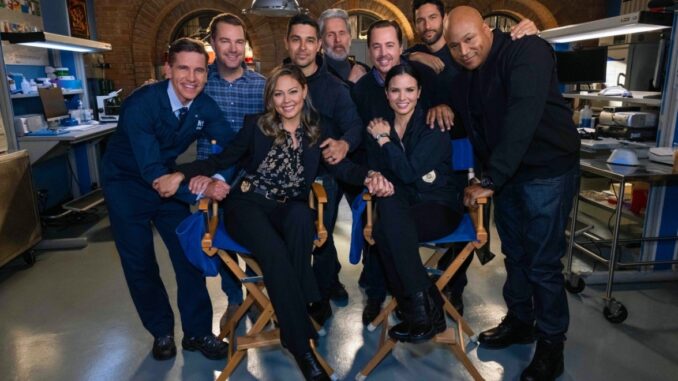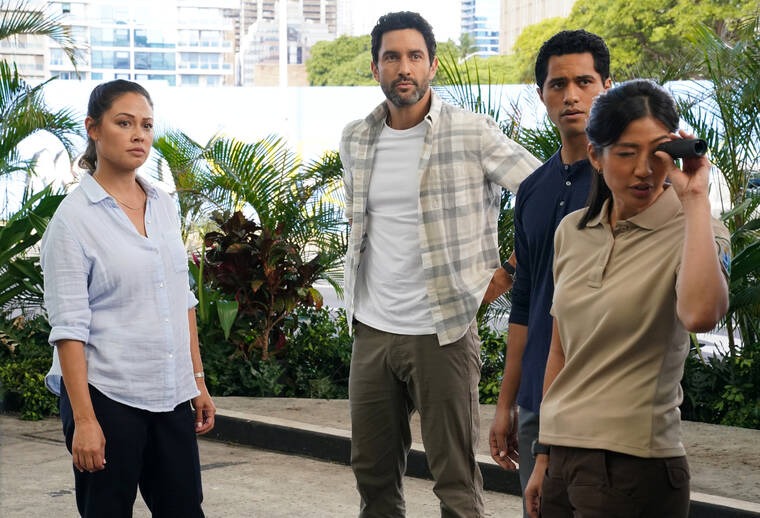
When NCIS: Hawai’i season 3 came to a close, it looked like everything would be alright for the cast of NCIS: Hawai’i. After solving a case and eliminating a deadly bioweapon threat on the island, Kai, Jesse, Lucy, Kate, Jane, Sam, Carla, and Ernie raised a glass of champagne and toasted their success. It was a riveting case and a joyous end. The writers could not have given the characters a better series finale – if that was how it ended.
However, when Jane arrived home from the celebration, her former mentor, Maggie Shaw, was waiting on the couch instead of her daughter Julie. She told Jane that she needed to sit down to hear what she was about to say to her next. Then, the episode ended. It was a terrible ending for a series that would not live on to discover what the former CIA operative was about to say next.
The series could have quelled much frustration by simply cutting the final scene of NCIS: Hawai’i. That said, the series could have quelled much frustration by simply cutting the final scene of NCIS: Hawai’i. The memory of all the beloved characters from the show raising a glass on a beautiful day, celebrating their accomplishments and their success as a team, would have been a lovely picture to leave in the hearts and minds of those who didn’t want to see it end. While cutting the scene may have been extensive logistically, it would have been the right thing to do when bringing NCIS: Hawai’i to a close.
Let’s be real—when a show wraps up, fans want closure, not confusion. NCIS: Hawai’i had all the ingredients for a thrilling, emotional finale, but instead, many fans were left scratching their heads over one thing: the final scene between Jane Tennant and Maggie Shaw. What was supposed to be a touching farewell ended up feeling like a missed opportunity. Let’s break down why that moment didn’t hit home—and how trimming it could’ve made for a far more satisfying ending.
What Went Wrong With Jane & Maggie’s Scene?
The Scene That Left Fans Cold
Remember that final exchange? The one where Jane confronts Maggie after years of betrayal, lies, and international chaos? Yeah, it should have been explosive, cathartic, or at least meaningful. But it wasn’t. It felt rushed, emotionless, and almost like an afterthought. That’s not what you want in your series finale.
No Closure, No Catharsis
Fans had been emotionally invested in Jane and Maggie’s friendship since Season 1. They deserved a moment that acknowledged all that tension and history. Instead, the show served up a lukewarm goodbye that felt more like a scene cut from an earlier episode—not a climactic ending.
The Pacing Problem
Let’s face it: finales are tight. You’ve got loose ends, big reveals, character arcs to tie up. But if a scene doesn’t elevate the episode or bring emotional weight, it doesn’t belong there. That’s exactly the case with Jane and Maggie’s final moment.
What Should’ve Happened Instead?
Focus on Jane’s Leadership Legacy
Rather than spending valuable screen time on a stale exchange with Maggie, the writers could’ve spotlighted Jane’s role as a trailblazing leader. Give her a montage, a medal ceremony, or even a quiet moment of reflection. Show her impact, not her grudges.
Highlight the Team’s Bond
Let’s be real—NCIS is all about the team. Cutting the Maggie scene would’ve given us more time with Kai, Lucy, Jesse, and the rest. A final team mission or a heartfelt group moment would’ve left fans with full hearts instead of question marks.
Let Jane Walk Off Into the Sunset (Literally)
Wouldn’t it have been powerful to see Jane step away from HQ, look out at the ocean, and breathe in the future? That imagery alone beats the awkward Maggie confrontation hands down.
Why The Jane & Maggie Scene Felt So Off
Unresolved Tension With No Payoff
Their relationship had been a powder keg of secrets, betrayals, and complicated loyalties. But the final scene treated it like an average Tuesday. No fire. No fight. Just… meh.
Character Consistency Took a Hit
Jane Tennant is sharp, emotionally intelligent, and fierce. So why did she suddenly seem cold and indifferent? Cutting the scene would’ve protected her character arc rather than diluting it.
It Distracted From Bigger Moments
In a finale, every second counts. This scene drained time and energy that could’ve gone to more meaningful beats—like Lucy and Whistler’s future or Jesse’s next move.
The Impact On Fans
Mixed Reactions Online
Twitter, Reddit, and fan forums lit up with mixed takes. Some defended the scene’s subtlety. Others straight-up hated it. But one theme kept popping up: It felt unnecessary.
Emotional Disconnect
Finales are supposed to make you cry, cheer, or at least feel something. But this scene left viewers feeling flat—like a wave that never broke.
When Nostalgia Isn’t Enough
Yes, Maggie was a big part of Jane’s past. But that doesn’t mean she had to be in the final moments. Sometimes the best goodbyes are the ones that never happen on-screen.
The Case For Cutting The Scene
Tightening The Narrative
Imagine a finale that flows seamlessly—without unnecessary bumps. Dropping the Jane-Maggie scene could’ve made room for tighter, more powerful storytelling.
Letting Actions Speak Louder
We didn’t need words to know Jane had grown past Maggie. A simple nod, a glance, or even just her absence would’ve said more than a flat conversation.

Giving Fans A Real Ending
What fans crave at the end of a show is emotional resolution. Not every character needs a send-off. Sometimes, silence speaks volumes—and that’s where this scene could’ve bowed out.
Conclusion: Sometimes Less Is More
NCIS: Hawai’i had so much going for it: a strong cast, stunning visuals, compelling stories. But in its final moments, it stumbled—not because it didn’t try, but because it tried to do too much. The Jane and Maggie scene, while well-intentioned, just didn’t land. And by letting it go, the finale could’ve soared. Sometimes, the best way to honor a character’s journey is not with more dialogue—but with the space to imagine what comes next.